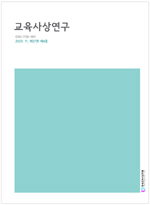- 영문명
- Aristotle’s Theory of Mousikē Education as a Response to Plato’s Critique
- 발행기관
- 한국교육사상학회
- 저자명
- 이정인(Jeong-In Lee)
- 간행물 정보
- 『교육사상연구』제39권 제3호, 139~165쪽, 전체 27쪽
- 주제분류
- 사회과학 > 교육학
- 파일형태
- 발행일자
- 2025.08.31

국문 초록
본 연구는 플라톤이 『국가』에서 제시한 시가(mousikē) 교육 비판에 대한 아리스토텔레스의 응답을 중심으로, 아리스토텔레스의 시가교육론을 교육 일반 이론의 틀 속에서 재구성하는 것을 목표로 한다.
플라톤은 『국가』 2-3권과 10권에서 비도덕성과 모방적 특성을 이유로 기존의 시가교육을 비판하며, 규범적 재구성을 요청하고 그 목적을 어린이의 품성 함양에 한정한다. 이에 대해 아리스토텔레스는 『정치학』, 『니코마코스 윤리학』, 『시학』 등에서 시가교육의 목적・내용・방법・효과를 플라톤과 다르게 정립하며 비판적으로 대응한다. 그는 시가교육의 또 다른 목적으로 인간의 여가와 관조적 삶을 위한 품성 함양을 제시하고, 시가의 개별 내용보다 내용의 배열과 구성을 중시한다. 그리고 모방(mimēsis)을 인간 본성에 기초한 창조적 학습 행위로 재규정하고, 시의 효과를 수용자의 능동성과 성찰 가능성 속에서 이해한다.
본 연구는 이러한 분석을 통해 아리스토텔레스가 플라톤의 시가교육에 대한 교육적 우려를 단순히 반박하기보다는, 플라톤의 비판을 검토하면서도 시가교육의 고유한 의의와 가능성을 교육적으로 재조명하고 있음을 주장한다. 나아가, 양자의 대비는 교육의 통일성과 자족성, 수동성과 능동성, 규범성과 해석성에 대한 상이한 철학적 입장을 드러내며, 이는 현대 교육 논의들에 대한 사상적 자원이자 철학적 재검토의 출발점이 될 수 있다.
영문 초록
This study aims to reconstruct Aristotle’s theory of mousikē education within the framework of general educational theory, focusing on his response to Plato’s critique in the Republic.
In Books 2-3 and 10 of the Republic, Plato criticizes traditional mousikē education for its moral inadequacy and mimetic nature, calling for its normative reconfiguration and restricting its purpose to the moral formation of children.In contrast, Aristotle, in the Politics, Nicomachean Ethics, and Poetics, redefines the aims, content, methods, and effects of mousikē education, responding critically to Plato’s position. He identifies the cultivation of character for leisure and the contemplative life as an additional aim, emphasizes the arrangement and composition of content over individual pieces, reinterprets mimēsis as a creative act of learning grounded in human nature, and understands the effects of poetry in light of the audience’s active engagement and reflective capacity.
This analysis shows that Aristotle does not merely refute Plato’s concerns but reconsiders and articulates the intrinsic value and potential of mousikē education. The contrast between the two highlights divergent philosophical positions on the unity and self-sufficiency of education, passivity and activity, and normativity and interpretability—offering both a theoretical resource and a point of departure for the philosophical reconsideration of contemporary educational discourse.
목차
Ⅰ. 서 론
Ⅱ. 플라톤의 시가교육론
Ⅲ. 아리스토텔레스의 시가교육론
Ⅳ. 요약 및 결론
참고문헌
해당간행물 수록 논문
참고문헌
최근 이용한 논문
교보eBook 첫 방문을 환영 합니다!

신규가입 혜택 지급이 완료 되었습니다.
바로 사용 가능한 교보e캐시 1,000원 (유효기간 7일)
지금 바로 교보eBook의 다양한 콘텐츠를 이용해 보세요!



